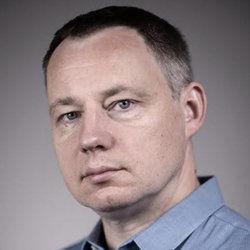
In his works Stanisław Lem has many times expressed a view that technology is an independent variable of civilisation. Even if one-direction relation seems too simplified, states, markets, businesses, and consumer behaviours are now shaped by technology development.
Participants of the webinar cycle intoDigital can attend lectures from the borderland of technology and economic sciences. The goal of these meetings is the share of knowledge among staff from different units and integration of people interested in this field of science. Additionally, the seminars provide a platform for spreading knowledge beyond SGH.
Since the start of the cycle in November, eight lectures have already been held. So far the topics concentrated mostly around two main areas: artificial intelligence and digital platforms. Speakers also presented information about quantum computers and graph theory, with emphasis on their application in economic sciences.
I. The topic of the first lecture was QUANTUM COMPUTING FOR BUSINESS. It was given by Dr Sebastian Zając, physicist specialising in the theory of elementary particles, which he currently uses for business analyses and applications. The lecture presented possibilities of use of quantum computers, as well as algorithms allowing for innovative solutions of optimisation problems and for machine learning. It was preceded by an introduction explaining key concepts of quantum physics, which are a basis for quantum computing with reference to artificial intelligence development.
DR SEBASTIAN ZAJĄC is an assistant professor at the Decision Analysis and Support Unit SGH. He carries out research on the use of quantum computing and quantum machine learning in optimization problems. At SGH he runs a class on the introduction to quantum machine learning.
II. During the second lecture, WHO SAID IT: A HUMAN OR ALEXA? Dr Wojciech Trzebiński talked about how consumers respond to information provided by AI (e.g. sale chatbots). It turns out that the response for such information depends on the degree to which consumers consider a machine to be able to understand a product and a consumer. That is why AI recommendations based on product features are perceived better than those based on benefits, and empathy demonstrated by a chatbot may in some situations be perceived negatively. Moreover, research shows that consumers respond better to information from AI, if they perceive it as more “human”. Dr Trzebiński presented latest results of research, including SGH experiments on consumers’ response to AI advice on planning classes. The presentation was followed by an interesting discussion about what should be the priority focus of AI application designers: their operation quality or measures that would make their recommendations and advice better received by users.
DR WOJCIECH TRZEBIŃSKI works at the Department of Market, Marketing and Quality of SGH. He is interested in consumer response to product communication and consumer experience in digital environment. Currently he is engaged in research projects in collaboration with University of Nevada, Reno, University of Tennessee, Knoxville, (USA), University of Antwerp (Belgium), Erasmus University (the Netherlands) or Sakarya University (Turkey).
III. The topic of the third lecture was APPLICATION OF GRAPH THEORY IN SOCIAL PHENOMENA MODELLING
It was given by Professor Paweł Prałat from the Department of Mathematics of Toronto Metropolitan University in Canada. According to Professor Prałat, practically each interaction with humans or technology generates data that are in relation with each other. Consequently, many social problems can be analysed as complex networks, whose nodes represent analysed entities, and edges – as relations between them. Graph theory is a field of mathematics that studies features of such objects. Exploration of complex networks to understand rules governing the way they are organised, and the way entities behave within a web is currently an important subject of research both in social and exact sciences. It explains, among other things, functioning of social networks, and is also used in big language models, which are a foundation of services such as ChatGPT.
The lecture focused on a method called graph embedding. The method is based on network transformation of graph structure on n vertices to a family of n vectors. In other words, after transformation each vertex is assigned a vector, which defines features and function of the vertex in the network. Thus, it is possible to detect nodes with specific characteristics, which in social networks can be for instance opinion makers or bots pretending to be users.
PAWEŁ PRAŁAT is a professor at the Department of Mathematics of Toronto Metropolitan University in Canada. He is also an associate professor at the Decision and Analysis Support Unit of SGH. In his research he concentrates on exploration and modelling social networks connected with random graphs.
IV. AI REGULATION – INTERNATIONALLY COORDINATED APPROACH is the topic of the fourth lecture given by Robert Kroplewski, representative of the digitization minister for information society. Artificial intelligence poses interdisciplinary questions. AI modelling and application entails both advantages and risks for people, enterprise, society, and our planet. As a breakthrough technology, it also affects supply chains and competitiveness on the market, as well as resource management. Organisations such as OECD, the European Union, UNESCO, the Council of Europe, UNCITRAL, WIPO, or the UN, have presented their agendas to tackle AI regulation challenges in terms of ethical, economic, legal, and standardisation and technical aspects. As a result of these measures, artificial intelligence has for the first time become an object of both so-called hard law regulations and soft law in the form of ethical guidelines or technical recommendations. Results of these works are translated into implementation guidelines for entrepreneurs, but also creators of intelligent solutions, including researchers, and finally into obligations of states – members of international organisations listed above.
ROBERT KROPLEWSKI is a legal advisor, high-level expert in working parties on artificial intelligence. He is also an author of a strategic document, adopted by a resolution of the Council of Ministers, titled “Policy for the development of Artificial Intelligence in Poland by 2020”.
V. Fifth lecture, CONSTRUCTIVE DISCUSSION ABOUT ARTIFICIAL INTELLIGENCE was given by Borys Stokalski, expert from Global Partnership for AI (GPAI) on the Future of Work. Complexity of digital products and services has been growing for decades. Digital solutions have also become increasingly interdependent; even a simple service launched in a cloud can be perceived as a very complex item, considering the complexity of infrastructure it operates on and connections with other services. The increasing complexity of digital solutions raises multiple problems of practical nature.
The seminar presented CAST (Constructive Approach to Smart Technologies) framework and proposed a concept of framework supporting responsible design of solutions using artificial intelligence. It showed how to use it to plan the development of autonomous services, digital assistants, intelligent ecosystems or active digital models of real objects and processes (digital twins). CAST framework was created by a team of expert practitioners involved in the initiative Global Partnership for AI.
BORYS STOKALSKI is a co-creator of framework applied at GPAI to support designing solutions based on AI. He is also a co-founder and a partner of RETHINK, a firm specialising in supporting digital transformation of enterprises and public institutions, and an investor in young businesses creating products in the field of artificial intelligence and robotics.
VI. Sixth lecture, given by Tymoteusz Doligalski, was about BUSINESS MODEL OF DIGITAL PLATFORMS BASED ON CANVAS APPROACH. In the last twenty-five years digital platforms have radically changed the functioning of businesses and consumer behaviour, and have dominated undertakings in different industries, by introducing new rules of operation in their ecosystems. The lecture presented business model of digital platforms based on canvas approach. This approach presents common elements of digital platforms, irrespective of whether they are virtual communities or electronic markets. Special attention was given to mechanisms of adjusting supply and demand, and abusing the platform’s privileged position.
TYMOTEUSZ DOLIGALSKI manages e-Business Unit of SGH. He specializes in research on digital platforms, e-business and marketing models in the internet. He guided student teams winning global competitions in the use of internet search engines (GOMAC and GOMC). He publishes his articles and research notes on his blog DOLIGALSKI.NET.
VII. Seventh lecture, INTRODUCTION TO CYBERSECURITY OF ARTIFICIAL INTELLIGENCE SYSTEMS, was given by dr hab. inż Jerzy Surma from Institute of Information Systems and Digital Economy. It discussed the issue of intentional attacks on artificial intelligence systems on the example of supervised machine learning systems. Professor Surma presented taxonomy of attacks involving interference with such systems on every stage of their life cycle. It is a particularly important issue in the situation of currently scant awareness of such potential threats, with simultaneously common use of artificial intelligence in business practice. These problems are broadly presented in the monograph Hakowanie sztucznej inteligencji [Hacking artificial intelligence].
DR HAB. INŻ. JERZY SURMA, Professor of SGH at the Information Technology Unit and manager of postgraduate studies on Cybersecurity Management and Business Intelligence. Earlier he worked as a visiting professor at Harvard Business School. He runs a popular science channel on YouTube: HTTPS://WWW.YOUTUBE.COM/@JERZYANDRZEJSURMA.
VIII. DIGITAL PLATFORMS IN THE LIGHT OF CJEU CASE LAW is the subject of the eighth lecture, given by Dr Małgorzata Godlewska form Department of Administrative and Financial Corporate Law of SGH. She presented selected case studies from the CJEU case law, concerning digital platforms:
- Uber – case C-434/15, where Article 56 on freedom to provide services of the Treaty on the Functioning of the EU (TFEU) does not apply to Uber;
- Airbnb – case C-390/18, where services of Airbnb are classified as information society services, or case C-674/20, where Airbnb providing to tax authorities specific data requested by these authorities concerning transactions made on the platform does not breach Article 56 of TFEU;
- Facebook – case C-645/19 concerning cessation of use of social media plug-ins or monitoring pixels in the territory of Belgium.
Amazon – case AT.40462 – Amazon Marketplace and AT.40703 – Amazon Buy Box.
MAŁGORZATA GODLEWSKA is an assistant professor at the Department of Administrative and Financial Corporate Law of SGH. Her publications comprise economic analysis of the law in the context of artificial intelligence, innovation networks or digital platforms.
IX. GENERATIVE ARTIFICIAL INTELLIGENCE – MY COPILOT IN AN ORGANISATION. The lecture presented the role of the natural language in creating and understanding technologies. It referred to the upcoming era of co-pilots, or artificial intelligence, which is becoming our valuable co-worker. The speaker also made an attempt to answer the question: How can the natural language democratize technology? How does generative artificial intelligence support various areas of business – from operational measures, through data analysis, to managing the product , and even the whole organisation?
MARIUSZ GROMADA is a director of Customer Intelligence Department at Bank Millennium, where he is responsible for building client relationships and personalization based on in-depth data analysis. He is passionate about exact sciences and technologies. He runs a blog called MathSpace.pl, where he writes about mathematics, data analytics, physics, and cosmology. He is also an active participant and author of open-source projects.
X. DRIVERLESS CARS ARE STILL UNAVAILABLE – WHY AI STILL DOES NOT STEER OUR TRAVEL? A driverless car, riding on streets and public roads, was announced in 2017. However, despite many years that have passed, the project still has not been finalised. Achievements and failures experienced by high-tech leaders, most of all Waymo, a sister company of Google, but also by established automotive industry producers, having existed on the market for more than 100 years, were presented and discussed by Wojciech Paprocki. It is difficult to overstate the benefits that would be brought by a revolution in mobility services induced by driverless cars, or robotaxi. There is enough motivation to spend tens of billions of dollars on development projects worldwide. Nevertheless, we still cannot see the expected results. A human fully concentrated on driving a vehicle is still irreplaceable. We already know that AI solutions are capable of performing multiple complex tasks, but are not precise enough to steer processes happening in a dynamically changing environment. Certainly, development works in the technology sector are not wasted, as traditional cars (passenger vehicles, trucks, and buses) are equipped with more and more sophisticated driver assistance systems. This improves traffic safety and comfort of driving.
PROFESSOR DR HAB. WOJCIECH PAPROCKI is a professor of economic sciences. He conducts research and classes on the development and popularization of digital technologies, including artificial intelligence, in the economy. He is a director of Institute of Infrastructure, Transport and Mobility at the Collegium of Management and Finance of SGH.
XI. ARTIFICIAL INTELLIGENCE AND ECONOMIC GROWTH IN THE PERSPECTIVE OF TECHNOLOGY PECULIARITY According to median expert forecast by metaculus.com service, artificial general intelligence (AGI) at a human level will occur already in 2032. Its emergence will bring radical changes for the global economy and humanity as a whole. The lecture discussed various scenarios of the impact of AGI on the global economy, also in terms of acceleration of economic growth rate, falling demand for work, growing income inequality and possibilities of AGI self-improvement, as well as the issue of (im)possibility to ensure that AGI goals comply with long-term humanity well-being (so-called AGI alignment). The speaker presented arguments for the thesis that we are currently in a turning point of the human civilisation, and decisions concerning AI can be crucial for our common future. The perspective of AGI development carries not only opportunities, but also existential risks for humanity.
A lively discussion tackled also the issue of problematic measurement of intelligence caused by its multidimensional nature. The problems are particularly visible when we try to compare the intelligence of AI algorithms with a human.
PROFESSOR DR HAB. JAKUB GROWIEC is a head of Department of Quantitative Economics at the Collegium of Economic Analysis of SGH. His research focuses on the theory of long-term economic growth. In his latest works he deals with the role of mechanisation, automation, and technological development, including AI, in the economic growth. He is an author of the book Accelerating Economic Growth: Lessons From 200 000 Years of Technological Progress and Human Development (Springer, 2022), and a laureate of the National Science Centre Award (2020).
We would like to encourage all those interested to actively participate in the coming semester. Information on further meetings can be found in SGH newsletter, event section on the university website or seminar profile on LinkedIn (HTTPS://WWW.LINKEDIN.COM/COMPANY/INTODIGITAL/). Recordings of previous lectures are available on YOUTUBE.

DR HAB. TYMOTEUSZ DOLIGALSKI, prof. SGH, Deputy Director of the AI Lab – Intercollegiate Centre for Artificial Intelligence and Digital Platforms, Head of the e-Business Unit, SGH Collegium of Economic Analysis



